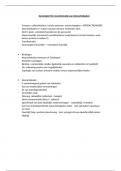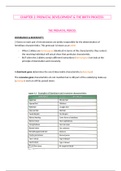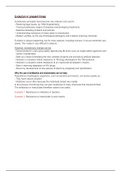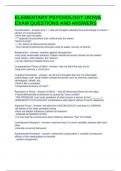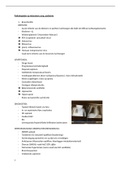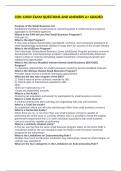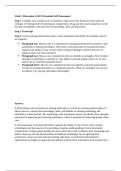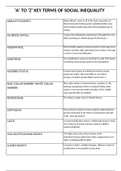EXAM LATEST UPDATES 2024-2025 ACTUAL EXAM
QUESTIONS AND CORRECT DETAILED ANSWERS (100%
CORRECT VERIFIED ANSWERS) WGU D570 EXAM 2025
ALREADY GRADED A+
A person is recalling an event that started a war. Which scenario
describes a flashbulb memory? - ANSWER-Person can recall the
goosebumps they felt when they first heard about the war events on a
new broadcast
What was the significant outcome of Saul Kassin's research on false
confessions? - ANSWER-recommendation to forbid the practice of
presenting false evidence during police interrogations
analytic introspection - ANSWER-a technique used by Wilhelm Wundt
that involved trained participants describing their experiences and
thought processes in response to stimuli
artificial intelligence - ANSWER-a field of study aiming to make
machines behave in ways that would be considered intelligent if a
,human were behaving that way as defined by John McCarthy during the
Dartmouth conference
behaviorism - ANSWER-an approach to psychology founded by John
Watson that emphasizes the study of observable behavior and rejects
introspection and the investigation of unobservable mental processes
classical conditioning - ANSWER-a form of learning introduced by Ivan
Pavlov and associated with John Watson, wherein a neutral stimulus
becomes associated with a meaningful stimulus, resulting in a learned
response
cognition - ANSWER-all mental abilities, including perceiving, learning,
remembering, thinking, reasoning, and understanding
cognitive psychology - ANSWER-the study of mental processes,
encompassing characteristics and properties of the mind and how it
operates
cognitive paradigm - ANSWER-the approach of focusing on
understanding mental processes and the operation of the mind which
emerged during the cognitive revolution
cognitive revolution - ANSWER-a shift in psychology from behaviorism
to a focus on understanding mental processes, which occurred during
,the 1950s and was marked by events such as conferences on artificial
intelligence and information theory
decision-making process - ANSWER-the mental process involved in
making choices as inferred from behavior in Donder's experiment
filter model of attention - ANSWER-a flow chart proposed by Donald
Broadbent in the 1950s that depicts the operation of the mind in terms
of processing stages, particularly in directing attention to stimuli in the
environment
Functional Magnetic Resonance Imaging (fMRI) - ANSWER-a brain
imaging technique introduced in 1990 that allows the observation of
activated areas in the human brain during cognitive activity without
radioactive tracers
higher mental processes - ANSWER-the complex cognitive functions,
such as thinking, problem-solving, and long-term remembering
considered in the study of cognitive psychology
Operant Conditioning - ANSWER-a form of learning introduced by B. F.
Skinner that focuses on how behavior is strengthened by the
presentation of positive reinforcers or the withdrawal of negative
reinforcers
, Stimulus-response relationships - ANSWER-the association between a
stimulus and the resulting behavior, a central focus of behaviorism
scientific revolution - ANSWER-a significant shift in scientific thinking
from one paradigm to another, marked by changes in dominant ideas
and approaches
Sensory memory - ANSWER-a stage in Atkinson and Shiffrin's model of
memory that holds incoming information for a fraction of a second
Short-term Memory - ANSWER-a stage in Atkinson and Shifrin's model
of memory with limited capacity, holding information for seconds
Biological Milestones - ANSWER-universal developmental events such
as puberty
cognition - ANSWER-all mental abilities including perceiving, learning
remembering thinking, reasoning and understanding
cognitive development - ANSWER-development of thinking and
reasoning abilities
developmental milestones - ANSWER-normative events marking stages
in development

